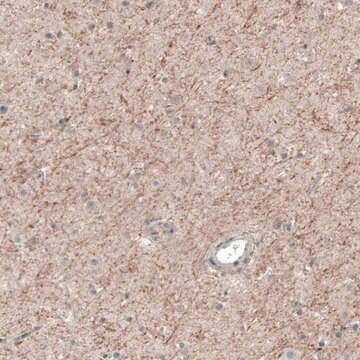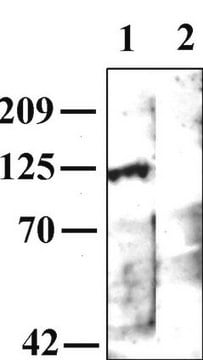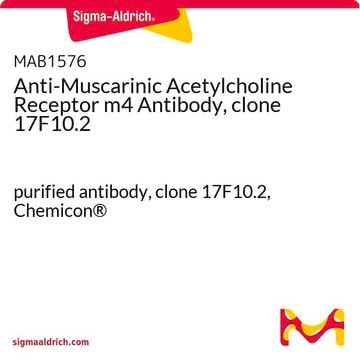MAB367
Anti-Muscarinic Acetylcholine Receptor m2 Antibody, clone M2-2-B3
clone M2-2-B3, Chemicon®, from rat
Synonyme(s) :
Muscarinic Receptor Antibody
About This Item
Produits recommandés
Source biologique
rat
Niveau de qualité
Forme d'anticorps
purified immunoglobulin
Type de produit anticorps
primary antibodies
Clone
M2-2-B3, monoclonal
Espèces réactives
human, monkey, rat
Réactivité de l'espèce (prédite par homologie)
mammals
Fabricant/nom de marque
Chemicon®
Technique(s)
immunocytochemistry: suitable
immunohistochemistry: suitable
immunoprecipitation (IP): suitable
Isotype
IgG2a
Adéquation
not suitable for immunohistochemistry (Paraffin)
Numéro d'accès NCBI
Numéro d'accès UniProt
Conditions d'expédition
wet ice
Modification post-traductionnelle de la cible
unmodified
Informations sur le gène
human ... CHRM2(1129)
Spécificité
SPECIES REACTIVITIES:
Expected to react with most mammalian species.
Immunogène
Application
Immunoprecipitation Works poorly for immunoblotting Optimal working dilutions must be determined by end user.
IMMUNOHISTOCHEMISTRY PROTOCOL FOR MAB367
This antibody has been used successfully on 30 mm, free floating, 4% paraformaldehyde fixed rat brain tissue. All steps are performed under constant agitation. Suggested protocol follows.
1) 3 x 10 minute washes in TBS (with or without 0.25% Triton).
2) Incubate for 30 minutes in TBS with 3% serum (same as host from secondary antibody).
3) Incubate primary antibody diluted appropriately in TBS with 1% serum (same as host from secondary antibody) (with or without 0.25% Triton) for 2 hours at room temperature followed by 16 hours at 4°C.
4) 3 x 10 minute washes in TBS.
5) Incubate with secondary antibody diluted appropriately in TBS with 1% serum (same as host from secondary antibody).
6) 3 x 10 minute washes in TBS.
7) ABC Elite (1:200 Vector Labs) in TBS.
8) 2 x 10 minute washes in TBS.
9) 1 x 10 minute wash in phosphate buffer (no saline).
10) DAB reaction with 0.06% NiCl added for intensification.
11) 2 x 10 minute washes in PBS.
12) 1 x 10 minute wash in phosphate buffer (no saline).
Neuroscience
Neurotransmitters & Receptors
Forme physique
Stockage et stabilité
Autres remarques
Informations légales
Clause de non-responsabilité
Vous ne trouvez pas le bon produit ?
Essayez notre Outil de sélection de produits.
Code de la classe de stockage
10 - Combustible liquids
Classe de danger pour l'eau (WGK)
WGK 2
Point d'éclair (°F)
Not applicable
Point d'éclair (°C)
Not applicable
Certificats d'analyse (COA)
Recherchez un Certificats d'analyse (COA) en saisissant le numéro de lot du produit. Les numéros de lot figurent sur l'étiquette du produit après les mots "Lot" ou "Batch".
Déjà en possession de ce produit ?
Retrouvez la documentation relative aux produits que vous avez récemment achetés dans la Bibliothèque de documents.
Notre équipe de scientifiques dispose d'une expérience dans tous les secteurs de la recherche, notamment en sciences de la vie, science des matériaux, synthèse chimique, chromatographie, analyse et dans de nombreux autres domaines..
Contacter notre Service technique








